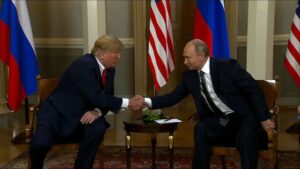The recent proposal by President Trump for denuclearization talks could signal a shift in U.S. foreign policy, but faces skepticism due to existing tensions with Russia and China.
Trump Proposes Denuclearization Talks with Russia and China Amid Tensions

Trump Proposes Denuclearization Talks with Russia and China Amid Tensions
President Trump suggests new negotiations for arms reduction, potentially reshaping U.S. nuclear policy and relations with global powers.
President Donald Trump has recently indicated a substantial shift in global nuclear policy by suggesting denuclearization talks with both Russia and China. During his address at the World Economic Forum in Davos, he stressed the immense financial burden of nuclear arsenals and the pressing need for dialogue to mitigate these costs.
“Tremendous amounts of money are being spent on nuclear, and the destructive capacity is something we don’t even want to talk about today, because you don’t want to hear it,” Trump stated, advocating for discussions among Washington, Moscow, and Beijing aimed at exploring potential arms reduction agreements.
This proposal emerges in a context marked by strained relations between the U.S. and both Russia and China. In 2023, Russian President Vladimir Putin announced the suspension of participation in the New START treaty, a pivotal nuclear arms agreement, citing U.S. backing for Ukraine as a catalyst for this decision. Additionally, Russia has faced numerous accusations of breaching the treaty’s stipulations. On the other hand, China has not engaged in formal arms reduction discussions with the U.S., making any negotiation initiatives overwhelmingly challenging.
Trump’s call for nuclear talks could potentially indicate a major pivot in U.S. foreign policy, heightening prospects for a reduction in global nuclear arsenals. However, skepticism looms over the reliability and willingness of Russia and China to adhere to any prospective agreements.
As the administration gears up for this potentially transformative diplomatic initiative, the world watches closely to discern whether common ground can be established among Washington, Moscow, and Beijing, or if enduring geopolitical frictions will perpetuate a persistent nuclear standoff.



















